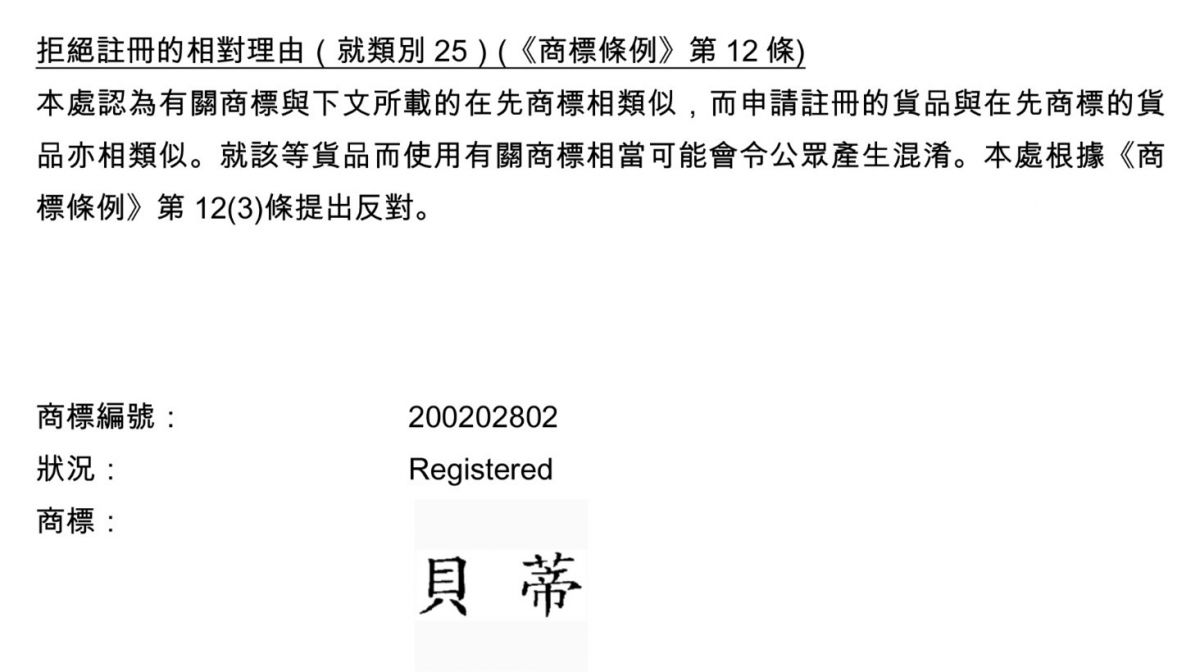Many Applicants thought that applying a trademark registration is as simple as a company registration, that even if similar name is registered, its mark still could be registered with small differences. We (Right IP) are frequently heard by applicants that "my mark has one more letter", "my design looks different" etc. They felt unacceptable that the found similar marks would block their registration in our pre-search or official rejection.
The main function of trademark is to distinguish the products or services of one trader from those of others. Accordingly, trademark laws in most of the jurisdictions ruled its trademark office shall reject the trademark application, if any similar trademark in similar goods and services was found.
The trademark case that we would like to introduce is "Dibe 蒂貝", which covers sex toys and sexy clothing. The Trade Mark Registrar rejected to grant registration according to Section 12 of the Hong Kong Trade Marks Ordinance, in view that it is similar to an earlier trademark "貝蒂" (pronounce BEIDI, reverse of “蒂貝”), which is covering clothing, and likely to cause confusion to the public.
It is common that the official rejects a trademark application due to likelihood of confusion in examination. However, what we must pay attention to the standard of judging similar in different jurisdictions. Even the same situation in different jurisdictions, the results would be much different. It is because the criteria for judging whether similar, subjective of examiners, social customs, culture, languages and legal principles being applied. When persuading the official, you must not only have a good knowledge about the local culture, language, social customs, but also the latest criteria and judgement of trademark examination, the precedents of similar situation, legal principles or any judges’ conclusions could be cited. Moreover, the background of such trademark owners should also be considered while making the counter strategies. Although this cannot be generalized, drafting a argument for appealing the rejection should take into account local circumstances.
Although Chinese can be written and read either from right to lift (traditionally), or from lift to right (nowadays), the key is how to proof that "貝蒂" would not be read reverse as "蒂貝" in this case. We found that the trademark owner of "貝蒂" who also owns "BETTY BOOP", and confirmed that the official Chinese name of "BETTY BOOP" is "貝蒂". We therefore cited 4 relevant common law precedents, and inputted above findings on the "global appreciation" test used by the Trade Mark Registry of Hong Kong when consider whether trademarks are similar. Finally, we successfully fight for the client and obtained registration for the case.
In a nutshell, the criteria and judgement of likelihood of confusion are based on local circumstances and inflected due to social environment changes, even the general principles in different jurisdictions are basically the same. When facing to a rejection of likelihood of confusion, we need to take into account local circumstances. We are keen to deliver suitable advice and maximize the interests for applicant with our extensive expertise in the field of trademarks and in-depth understanding of trademark laws in different jurisdictions.
If you have any questions relating to rejected trademark applications or facing a rejection, you can contact our specialists in the following ways:
Email: [email protected]
Tel/Whatsapp: +852 5327 3854 / +852 5336 1214
